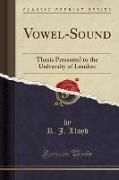- Start
- Vowel-Sound: Thesis Presented to the University of London (Classic Reprint)
Vowel-Sound: Thesis Presented to the University of London (Classic Reprint)
Angebote / Angebote:
Excerpt from Vowel-Sound: Thesis Presented to the University of LondonIt is evident, however, that such a state of things can only be temporary, that in fact we shall never continue to classify sounds according to the accidents of their origin when once we are able to arrange them after the essentials of their nature. Not indeed that we should slacken our study of articulations. Quite the reverse. But we ought to know why certain articulations produce certain sounds, and what is the intimate acoustic nature of the sounds thus produced. When that is done we shall certainly learn first to know the sounds per se, and then to know the reasons why certain articulations produce them. Until then we shall always be in danger of viewing the subject in an inverted perspective, hardly seeing that which ought to be the chief object of our view. Phonetics is defined to be the science of speech-sounds. N ow the first thing we want to know about a sound is its acoustic nature, our interest in its mode of production is only of a secondary kind.It follows then that in the phonetic science of the future speech-sounds will certainly be classed not according to their articulation, but according to their acoustic essence, and the study of articulations will be the first handmaid of Phonetics, but will stand no risk of being mistaken, as it now is, for Phonetics itself. This being so, it seems clear that the path of greatest usefulness at present in phonetic investigation is to enquire further into the acoustic nature of speech-sounds, and especially of vowels. This has been done already to a certain extent, but not to anything like a sufficient degree. Nearly every phonetician of the acoustic school has his own scheme or diagram of classification, wherein the vowels are duly arranged in an order which seems suitably to represent their relative affinities of sound: and some physicists also, notably Willis and Helmholtz, have made partially successful attempts to analyze the different vowels into their acoustic elements, and also to construct artificial vowels. But the latter attempt seems only to have succeeded well with the graver vowels, such as u and o: the attempt to produce i (english cc) was a failure altogether.About the PublisherForgotten Books publishes hundreds of thousands of rare and classic books. Find more at www.forgottenbooks.comThis book is a reproduction of an important historical work. Forgotten Books uses state-of-the-art technology to digitally reconstruct the work, preserving the original format whilst repairing imperfections present in the aged copy. In rare cases, an imperfection in the original, such as a blemish or missing page, may be replicated in our edition. We do, however, repair the vast majority of imperfections successfully, any imperfections that remain are intentionally left to preserve the state of such historical works.
Folgt in ca. 15 Arbeitstagen
